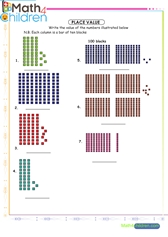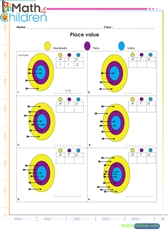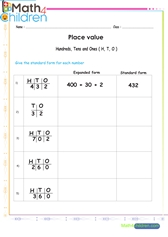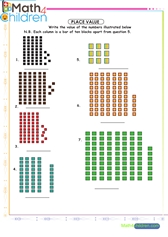![]()
Place Value Worksheets 3rd Grade
Place value worksheets 3rd grade. Learn to find the units, tenths, hundredths and thousandths place within numbers. PDF tests to Print and Practice
Early in their math education, children will be introduced to many fundamental concepts in mathematics that we take for granted as adults. The place value of a number, for instance, is something we usually overlook, as an adult will have spent most of their lives encountering the concept to the point where interpreting place values is often done unconsciously. Young children, on the other hand, will be understanding place values for the first time, and it is integral to be patient and explorative in helping them grasp this crucial subject.
As they get better at the topic, help them practice their newfound skill with the place value worksheets – 3rd grade on this page. Each worksheet has been designed with the learner’s comfort and productivity in mind. Our text is large and easy to understand, each item is neatly placed, and the entire layout is organized cleanly. Clumping a lot of items with a tiny font size usually looks unappealing and intimidating. Our sheets, on the other hand, provide enough empty space to draw your child’s attention to each item, as well as accommodate their solutions.
Kids will need all of the help they can get in learning this basic skill. One effective way in helping them to understand a number’s place value is through illustrations. We provide worksheets with colourful and clear illustrations to engage learners visually, as well as logically.
One of the best worksheet formats for place values comes in the form of value mats – that is to say, a table in which columns for each place value can be depicted – starting from the ones’ place value at the rightmost side to the tens’, hundreds’ or even thousands’ place value at the leftmost side.
A child will also learn place values through composing and decomposing numbers into their component values – the number 63, for instance, can be broken down into six tens and three ones. Though this exercise can appear simple and repetitive, its value (pun not intended) should not be underestimated.
Of course, as kids, it’s fine if you find them getting muddled with properly understanding the concept. One common slip-up comes from misinterpreting the value of 0 in a number such as 403. Some kids may think that since 0 typically represents no value, 403 can mean 43. In such a case, it’s necessary for you to step in and help them make a distinction between the two numbers by, say, identifying that the 4 in 403 means four hundreds and that there are no additional tens, while the 4 in 43 means 4 tens.




